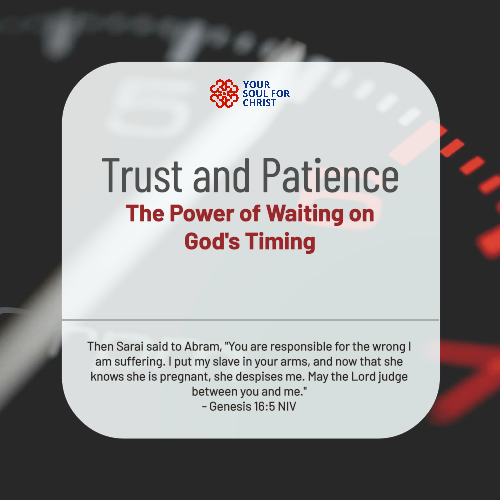Then Sarai said to Abram, “You are responsible for the wrong I am suffering. I put my slave in your arms, and now that she knows she is pregnant, she despises me. May the Lord judge between you and me.”
Genesis 16:5 NIV
Waiting on God’s timing is often challenging, especially when delays seem unending. Regret frequently follows decisions made in haste, particularly when people step outside of God’s will. In Genesis 16, Sarai and Abram learned this lesson the hard way. Their inability to wait on God’s timing led them to make choices that brought division, pain, and regret into their lives.
Sarai believed she could “build a family” through her Egyptian slave, Hagar. However, she failed to recognise the consequences of her actions. By stepping ahead of God’s plan, she unknowingly sowed seeds of discord in her household. Instead of uniting her family, her decision created a rift that disrupted their peace. Consequently, it gave the enemy an opportunity to exploit their weaknesses.
Also, Abram’s willingness to follow Sarai’s plan without seeking God’s guidance demonstrates the importance of waiting on God’s timing. Though Abram was at least 85 years old and had waited many years for the promised child, his impatience led him to act impulsively. The covenant God made with Abram should have reminded him to trust in God’s perfect timing. Instead, he allowed human reasoning to dictate his actions.
Another important aspect of this story is Hagar’s background. Hagar likely became part of Abram and Sarai’s household during their time in Egypt when Pharaoh gifted them possessions after Abram and Sarai deceived him by not saying Sarai was Abram’s wife. Hagar, as an Egyptian, likely had little understanding or appreciation of the righteousness Abram and Sarai were called to pursue.
When Hagar realised she was pregnant, her attitude toward Sarai shifted. She began to look down on her mistress, and this behaviour change fueled resentment. Hagar’s pride in her newfound status as Abram’s wife and the mother of his child led her to despise Sarai, who remained childless.
Sarai, in turn, became overwhelmed with regret and frustration. She held Abram accountable for the situation, saying, “You are responsible for the wrong I am suffering. I put my slave in your arms, and now that she knows she is pregnant, she despises me. May the Lord judge between you and me.” Sarai’s impatience in waiting for God’s timing and her decision to act independently resulted in a fractured household, filled with disrespect and enmity.
This story highlights how the enemy exploits human weaknesses to bring about division and pain. Once the decision was made, its consequences could not be undone. Hagar, now carrying Abram’s child, was no longer merely a slave but held a new, significant role in the household. This shift gave the devil an opportunity to deepen the discord within the family.
The lesson from this story is clear: it is crucial to guard against giving the enemy any foothold, no matter how small it may seem. The devil seizes every opportunity to exploit our weaknesses, create division, and disrupt God’s plan.
In reflecting on this story, I am reminded of the importance of seeking God’s guidance in every decision and waiting patiently for His timing. Acting independently of His will often leads to regret and unintended consequences. May God help and guide us from the enemy’s influence. May He give us the wisdom and strength to resist any temptation that might allow the devil a foothold.
In conclusion, this story serves as a timeless reminder of the consequences of stepping outside of God’s will and the failure of waiting on God’s timing. Patience, faith, and reliance on God are essential in navigating life’s challenges and uncertainties. When faced with doubt or delay, trust in His promises, seek His guidance, and wait patiently for Him. Let this story inspire you to lean on God, knowing that His plan is always greater than our own and His timing is perfect.
